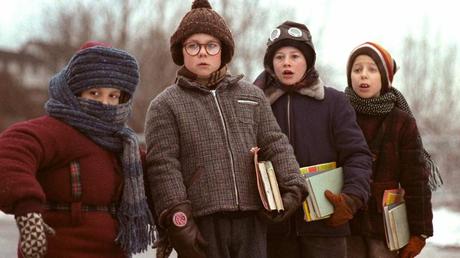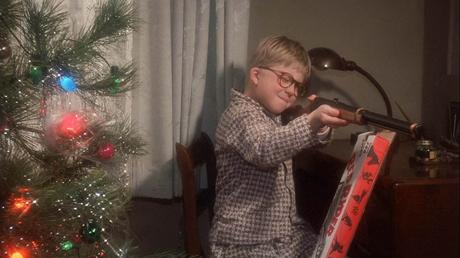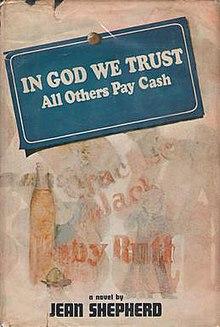
In the time since A Christmas Story was released in 1983, the voice of its narrator, Jean Shepherd, has become one of the most familiar sounds of the Christmas season. A Christmas Story is a prime example of a movie that only made a small impression in its initial release, but later reached classic status by building an audience afterward. After being released shortly before Thanksgiving 1983, most theaters were no longer playing A Christmas Story by the time Christmas came around. But thanks to screenings on television and home video releases in later years, A Christmas Story ended up becoming one of the most beloved Christmas movies of all time. It’s gone from barely being available on Christmas Day 1983 to being broadcast on TV for 24 hours every Christmas, in addition to being available to watch in any other conceivable way, from streaming to DVD, Blu-Ray, and 4K.
While A Christmas Story is credited as being based on Jean Shepherd’s novel In God We Trust, All Others Pay Cash, it’s most accurate to describe it as a radio-to book-to film adaptation. Several of the storylines from A Christmas Story originated as short stories Jean Shepherd had read on the radio. These stories feel like personal remembrances, but Shepherd always maintained they were fictional. (However, it’s believed that there may have been some degree of inspiration from his own childhood in Hammond, Indiana and people he knew there.) Some of those stories went on to be published in Playboy before being included in In God We Trust, All Others Pay Cash, which was released in 1966.
Book & Movie Differences
Since …All Others Pay Cash is a collection of short stories rather than a traditional novel, the book and the movie are structured very differently. In the book, the stories are framed in the context of adult Ralph Parker returning to his hometown of Hohman, Indiana and spending an afternoon with his old friend Flick at the bar he owns, reminiscing about events from their youth. Only a few of the stories from the book are depicted in the movie. The stories from …All Others Pay Cash featured in the movie are:
- “Duel in the Snow, or Red Ryder Nails the Cleveland Street Kid”
- “The Counterfeit Secret Circle Member Gets the Message, or The Asp Strikes Again”
- “My Old Man and The Lascivious Special Award That Heralded the Birth of Pop Art”
- “Grover Dill and the Tasmanian Devil”
The movie also has storylines inspired by some other short stories by Shepherd which weren’t part of …All Others Pay Cash. The part about the Bumpus hounds was based on “The Grandstand Passion Play of Delbert and the Bumpus Hounds,” which was published in Shepherd’s second book, Wanda Hickey’s Night of Golden Memories. (If you’re interested in reading the five main stories A Christmas Story was based on, those stories were later published together in 2003 in their own book, also titled A Christmas Story.) The part about Flick’s tongue getting stuck to a light pole also came from one of Shepherd’s stories, simply titled “Flick’s Tongue,” which was not published but had been read by Shepherd on the radio.

These stories cover most of the main events from the movie pretty well and even some of the smaller details from the stories made their way into the movie. For example, the “Duel in the Snow” story mentions gifts of a can of Simoniz, a fly swatter, a zeppelin, and a Frankenstein mask, all of which can be seen in the movie’s Christmas morning scene. But, of course, there are still some differences to be found. Most notably, Scut Farkus isn’t even a character in the story about the neighborhood bully. Instead, Grover Dill is the main bully rather than being the bully’s sidekick as he is in the movie. The story about Ralphie’s dad winning the infamous leg lamp gets into more detail about the effort he put into entering contests and his excitement about finding out that he had won something. It also explains that the leg design was the logo for a soft drink company. Another rather notable difference is that Ralphie doesn’t actually get a pink rabbit suit from Aunt Clara for Christmas. Instead, she just sends a pair of pink bunny slippers. He isn’t thrilled about the slippers, either, but it’s played into a bigger moment for the movie.
While the movie is set in 1940, many of the stories in the book are more rooted in the 1930s. The Depression is specifically mentioned several times throughout the book and it influences some of the main stories featured in the movie. The more Depression-specific aspects of it were lost in translation from page to screen. When Ralphie breaks his glasses while playing with his coveted Red Ryder BB gun on Christmas morning, the original line reads, “Few things brought such swift and terrible retribution on a kid during the Depression as a pair of busted glasses.” The part about the Depression was cut for the movie. The movie also mentions that Ralphie had to drink a lot of Ovaltine to be able to get the decoder pin needed for special messages during Little Orphan Annie radio broadcasts. But the “Counterfeit Secret Circle Member Gets the Message” story suggests that Ovaltine wasn’t something the Parker family could afford at the time. He ends up getting the decoder pin after finding a discarded Ovaltine container while playing Kick the Can on his way home from school and was stunned to find that some rich family had discarded the whole can, including the part he needed to send in. Ralphie describes himself as being in an oatmeal-eating family and listening to an Ovaltine radio show and mentions that he had never even seen a can of Ovaltine before.
Is the Book Worth Reading?

If you’re a fan of A Christmas Story, it’s definitely fun to go back and check out the original source material for so many of its most memorable moments. Jean Shepherd’s style of storytelling is so distinctive that it’s easy to imagine the whole book being read in his voice. They did an excellent job of weaving the different stories together to make a broader story for the movie, but it’s still interesting to see some of the extra details and context the original stories have to offer. Since only a few of the stories from In God We Trust, All Others Pay Cash were featured in the movie, the book is also a great chance for fans of the movie to get some extra stories about Ralphie and his family. With Shepherd’s witty and evocative writing style, it’s a very enjoyable read.
